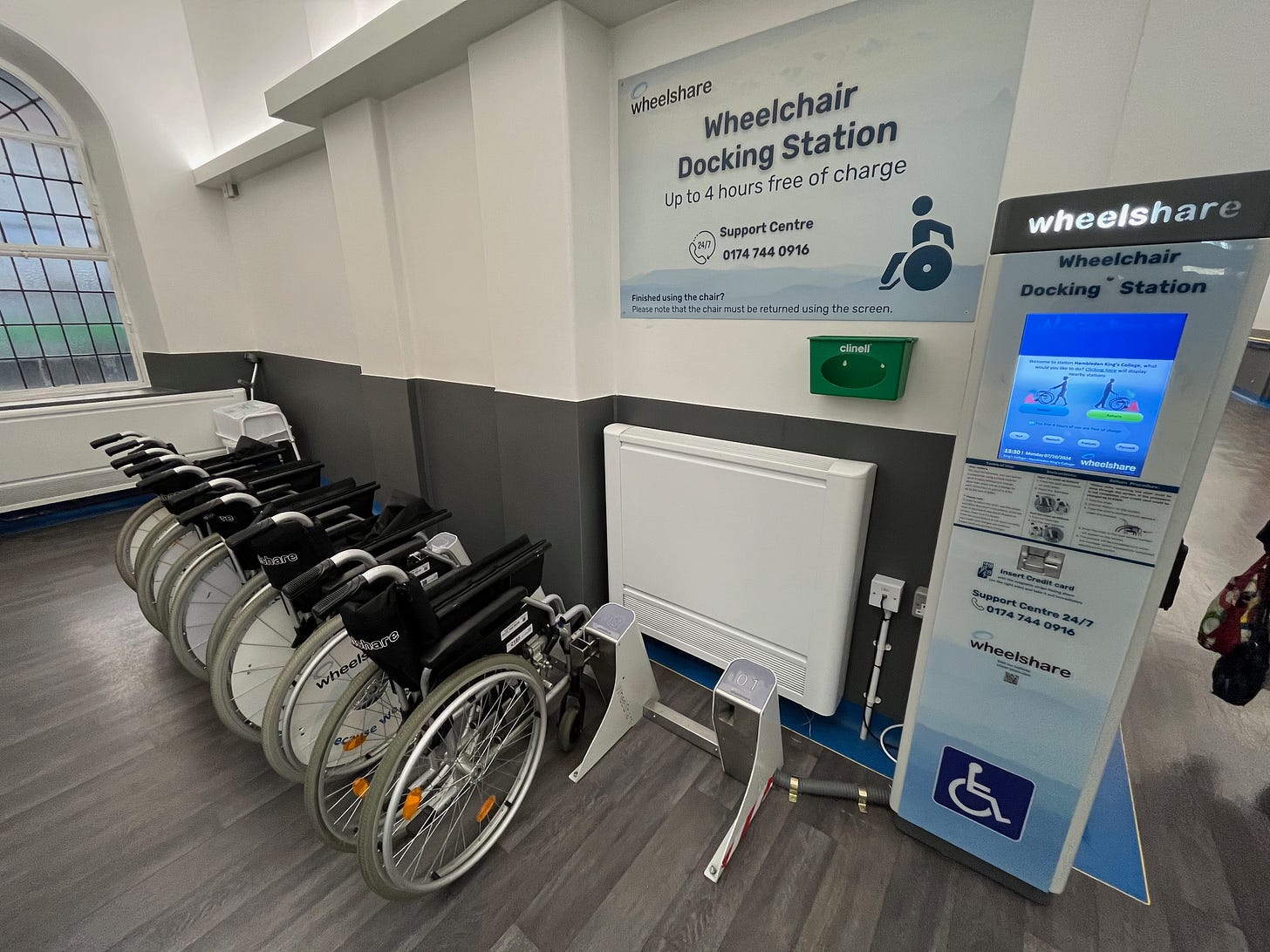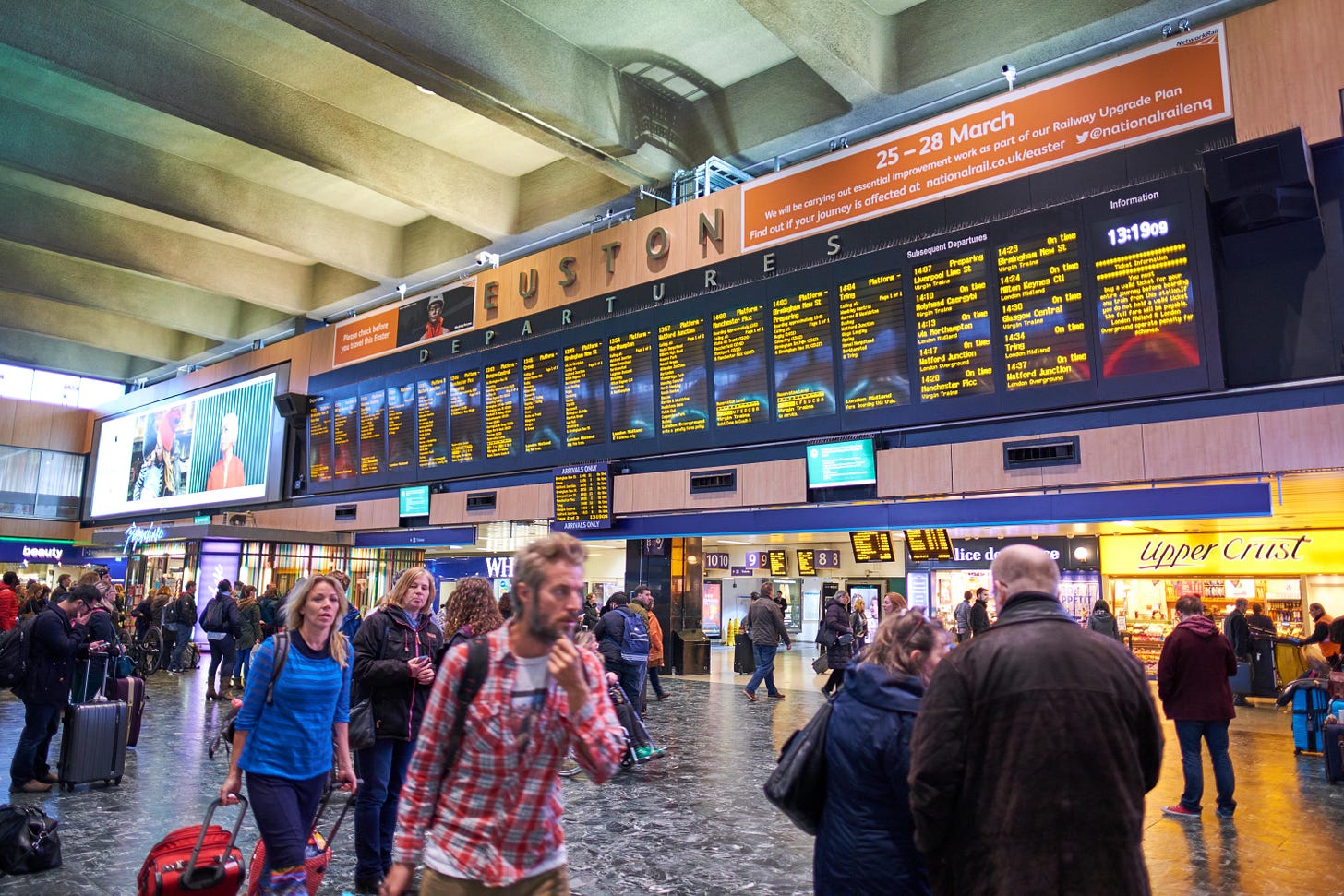Are London's foxes getting smarter?
Plus: the London hospital charging patients who can't walk for the use of wheelchairs and the mystery of the missing Euston departure boards.
Welcome to London Centric, where we spent last week going through financial filings, knocking on doors, and having the police called on us for asking questions. More on that soon.
When I launched this outlet I expected to focus on the weighty issues affecting London: Sadiq Khan’s record in office. The abysmal housing crisis. Exactly who is visiting the M&M’s store in Leicester Square.
But the single most popular question in the London Centric inbox was: Can you explain how the capital’s foxes have learned to open our bins?
Given this is a reader-led publication (I’m grateful for every suggestion and piece of feedback, big and small, that you send on WhatsApp), I set to work. What I discovered was astonishing: The London fox really does seem to be developing a swagger not seen outside the capital, with even its brain size changing compared to its country cousins. And increasingly bold foxes are hitting the budgets of skint London councils by undermining food recycling waste schemes.
Subscribers (and if you’re not one, you can click at the end for a free trial) can scroll down to read about how the cocky London fox is, like the city itself, increasingly pulling away from the rest of the country.
If you’re thinking of subscribing to London Centric then the launch offer — 25% off for a year — is still running for a little while longer. But it won’t last forever. Subscribing allows investment in original journalism, reporting, and legal fees.
Can’t pay? You’d better walk away
Exclusive: NHS hospitals in London are charging patients by the hour for wheelchairs used to get around their buildings, London Centric can reveal, as part of a new service offered by a private company.
Rather than have a stock of hospital owned-and-operated wheelchairs King’s College Hospital in Lambeth has installed a Boris Bike-style hiring service run by Wheelshare, a private healthcare business. Unless patients have come in an ambulance, people arriving at the hospital and unable to walk to A&E are pointed towards a hiring dock full of wheelchairs unlocked by a credit card machine.
Although the first four hours are free, after that each wheelchair costs patients £2/hour, with the cost being automatically charged to the user’s credit card. King’s has some of the worst waiting times in country, with some patients waiting up to 12 hours to be seen in A&E.
As one patient’s carer put it: “You can’t call an ambulance because of the waiting times. If you get to the hospital in a car you need to pay for transport while you wait in A&E. There’s literally a wheelchair shortage in a hospital”
A similar service has recently been installed at Hillingdon hospital in Uxbridge and is expected to be rolled out at other hospitals in the capital as part of an ambitious expansion plan by Wheelshare.
Wheelshare has recently started advertising branding opportunities, meaning patients could soon be paying to be wheeled around NHS hospitals in a privately-owned wheelchair covered in advertising from corporate clients. King’s College Hospital said they would not allow advertising on their wheelchairs.
On Monday London Centric talked to Christine, who had just paid for a wheelchair after her husband’s visit to King’s College Hospital took more than four hours. She said that while the system was efficient it all added up to the reality that nowadays “it’s very expensive being in hospital” due to various costs of visiting: “One year I probably spent a thousand pounds on parking.”
When London Centric approached King’s College Hospital NHS Foundation Trust, they said the rental scheme was designed to improve the supply of wheelchairs and the fees ensure they are returned by patients. A spokesperson said the hospital pays Wheelshare to provide the hire service: “The scheme helps ensure that every patient who needs a wheelchair can find one when they arrive at hospital. Patients using a wheelchair who experience longer waits for treatment are able to have these costs refunded by contacting Wheelshare directly.”
However, no such option for a refund was advertised when London Centric visited the hospital, nor was it mentioned in text messages sent by Wheelshare to patients who had been charged. Instead, when settling the bill for a wheelchair on the docking station, patients are prompted to pay an extra donation to the NHS hospital.
Euphemism of the week
In response to a Freedom of Information request Transport for London has revealed that the lifts at Hackney Central Overground station failed on 52 separate occasions over the last year, sometimes taking more than a week to be fixed, leaving passengers with mobility issues unable to access trains.
A copy of the station’s duty log reveals that during two of the breakdowns a passenger was stuck inside a malfunctioning glass box for up to an hour.
These were recorded with a deadpan technical note that a member of the public had been involved in a “lift entrapment” situation.
London is already a 15-minute city
The concept of the “15-minute city”, where everything you need for everyday life is accessible within a quarter-of-an-hour walk, has become a flashpoint in the global culture wars. A no-brainer to some, it became an insidious sign of state control to others, playing into conversations about low-traffic neighbourhoods closing roads, the power of government, and whether Bill Gates is controlling our minds with vaccines.
This project by the Sony Computer Science Laboratory in Rome attempts to show which areas of cities already meet the standard. There’s some issues with the methodology – not least the Italians’ conviction that London’s borders bulge into Essex – but the overall picture for the capital is stark. Blue areas already, on their measure, have access to key amenities such as healthcare and open spaces within a short walk. Aside from a few red patches around the capital’s rural fringes, London is already a 15-minute city.
Euston, we have a solution
It turns out it’s easy to fix an annoying issue with an advertising board at a London railway station: All you need is every journalist and politician in the capital to spend two weeks publicly moaning about it until a cabinet minister personally intervenes.
On Friday transport secretary Lou Haigh finally had enough of the whinging and ordered Network Rail to turn off a giant advertising board at Euston that had replaced the old departure boards, as part of a wider plan to revive the station.
That only leaves one question: Can we have our old departure board back, please? And where exactly is the 23-metre-long display?
We were scooped on this one by hotshot Sunday Times reporters Oliver Gill and Rosamund Urwin, yet for some reason their story never made it onto the newspaper’s website. So for the benefit of people who get their news online, the answer is: “The giant Euston departure board has been given to a private railway museum in Kent owned by a major financial backer of both Nigel Farage and Laurence Fox, where it is currently live and showing the real Euston train times.”
The businessman in question is Jeremy Hosking, major funder of Brexit, part-owner of Crystal Palace… and a massive railway enthusiast who is building his own (frankly fantastic-looking) museum in an old Hornby factory near Margate. Hosking has past experience of Euston, having previously run strike-busting private charter trains into the station when Avanti West Coast failed.
Exactly how a big lump of London’s nationalised rail infrastructure ended up in the possession of Hosking is a story in itself. According to Network Rail, a retired manager spent six months trying to find a home for the old departure board by personally approaching the National Railway Museum, the Science Museum and the Crewe Heritage Centre but nobody wanted the giant item. Out of desperation, he mentioned it to former Network Rail chairman Lord Hendy, who sent out an SOS to his contacts, prompting an offer from Hosking’s museum.
Aided by a grant from the Railway Heritage Trust, the board has now been reinstalled in Kent along with software that enables it to display live Euston departures to Birmingham, Manchester and Glasgow. Future generations will be able to travel to Kent and recreate the experience of preparing to sprint for an Avanti West Coast train.
It is notable that Hendy, who is now a rail minister in the Labour government, took such an interest in preserving Euston’s heritage. He hasn’t been seen in public since it was revealed he forced the sacking of railways engineer Gareth Dennis for publicly raising safety concerns about the station.
What does the fox say (about bin collections)?
When word spread among Crouch End residents that their era of fox-induced suffering was coming to an end, they couldn’t contain their glee. Street WhatsApp groups pinged with notifications. Local Facebook groups were flooded with happy emojis. The word was out on the streets of North London: The council was introducing a fox-proof food waste recycling bin.
“I can’t explain how excited people are about this,” said Haringey council cabinet member Seema Chandwani, who oversaw last month’s rollout of the new bins, which have a latch on the lid and have already been requested by thousands of residents. “It is something that really matters to people.”
For years Haringey council has been trying to boost recycling rates by giving residents small, separate bins for their food off-cuts and leftovers. The problem was that the council’s efforts were being undermined by the capital’s large population of foxes, which academics say is bolder than its countryside equivalent and is even showing signs of developing a different skull shape.
Keep reading with a 7-day free trial
Subscribe to London Centric to keep reading this post and get 7 days of free access to the full post archives.






